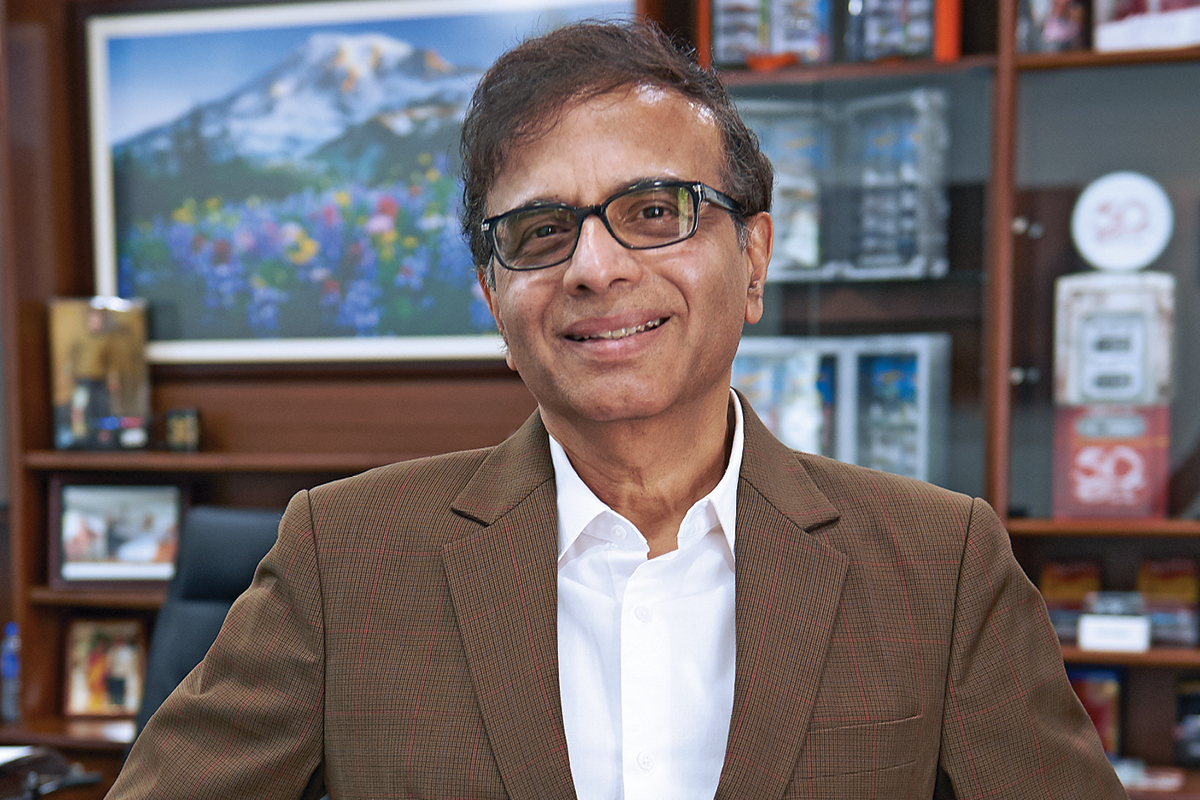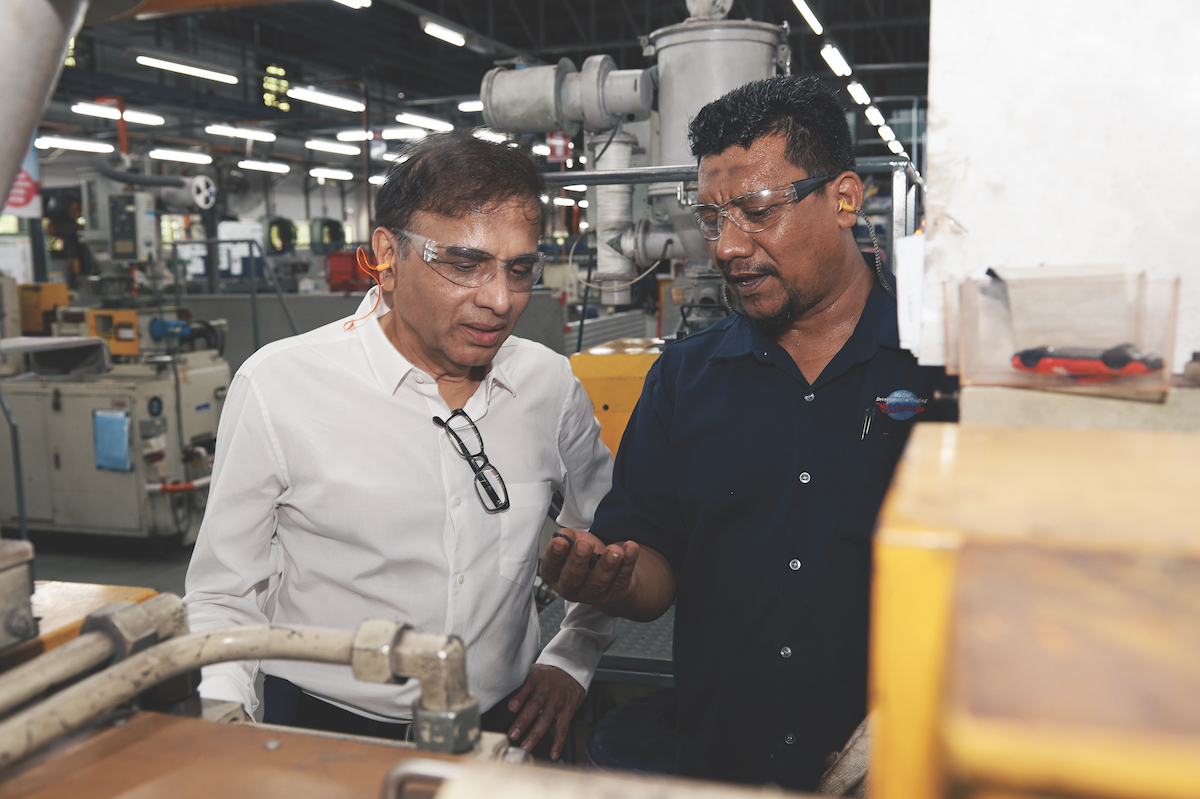Toy story: Nat Arjun
From the children who play with Hot Wheels cars to his own team members, Vice President and General Manager of Mattel Thailand and Malaysia Nat Arjun is passionate about inspiring the next generation.
Can you guess which company is the largest car manufacturer in the world? No, it’s not Volkswagen, Toyota, Renault, General Motors, Ford or Hyundai. Here’s a hint: the vehicles made by this company can fit in the palm of your hand. Yes, it’s hard to believe, but multinational toy company Mattel actually produces more cars than any other company – even if they are miniature versions of the real thing.

In his role as Mattel Thailand and Malaysia Vice President and General Manager, Nat Arjun oversees the production of diecast Hot Wheels and Matchbox vehicles in both countries.
"We proudly say that we are the largest car manufacturer in the world," he says, grinning. "We make millions of vehicles in a week. But it is the diversity of our products that makes us unique – we make more than 2,000 different types of vehicles in a year, many with complex decorations."
"We make more than 2,000 different types of vehicles in a year, many with complex decorations."
Since starting out in Mattel’s finance department in the United States in 1985, Nat has spent the past three decades working his way up through the ranks. "From the beginning I was very happy with the style of leadership in the company and the entrepreneurial culture," he reflects.
"Over time, in most large companies, silos and bureaucracies tend to develop. The leadership at Mattel has continuously and consciously attempted to attack such silos and bureaucracies. I was given a lot of opportunities to grow within the company. At Mattel, what you can be is limited only by your talents and abilities."
Following stints working at the toy giant’s manufacturing plants in Indonesia and Mexico, Nat became Vice President and General Manager of the Thailand facility in 2011. Last year, he also took on responsibility for Mattel’s Malaysian operations. Nat says working with people is what he enjoys most about his role.
"My job gives me the opportunity to interact with people at all levels," he says. "Having worked in seven different countries, I now see that, in general, people all over share the same desires, ambitions and motivations.
The cultural differences that we see between someone, say, in Thailand, the United States or Mexico are very superficial. In my opinion, once our basic needs of food, shelter, etc, are satisfied, we all crave to be recognised.
"We come to work every day and everybody wants to do meaningful work that makes us feel fulfilled. I believe no one is deliberately intent on doing shoddy work. Once we understand this, our job as a leader becomes very fulfilling."

Leading from the heart
If there’s one topic Nat is particularly passionate about, it’s mentoring and leadership. "Nurturing young talent and seeing them grow is the ultimate experience any professional would want to have," he enthuses. Nat firmly believes every leader should have three key qualities: integrity, inspiration and insight.
"A great leader empowers his people to achieve what they would not have imagined possible. It’s the opposite of dominance. "Insight, or vision, essentially means the leader can see or perceive things that no one else sees.
This has nothing to do with any occult powers, but it allows the leader to rationally and logically analyse a situation and understand the most probable outcomes. Integrity is about not only being true to oneself, but also pursuing goals beyond one’s own success that the people in the team are aspiring to achieve.
"A great leader empowers his people to achieve what they would not have imagined possible. It’s the opposite of dominance."
"Finally, a true leader should inspire everyone around him or her to wholeheartedly pursue the common goals for the common good."
Nat prides himself on being an inclusive leader who takes the time to listen to his employees and values their input. This applies to not only those working in senior management positions, but also factory workers.
"The people working on the production floor have many great ideas as to how we can improve processes. From better ergonomics to reducing the cycle time of a machine, these ideas save us between US$500,000 and US$1 million every year," Nat reveals.
"Every suggestion that gets implemented makes that employee feel like the owner of the process and he or she feels more invested in the company."
According to Nat, workplace safety is also a high priority at Mattel, and this also helps to boost employee morale. "You know the safety culture is firmly established when employees police themselves on proper safety procedures because they naturally care for their co-workers," he points out.
Hot Wheels of fortune
The first Hot Wheels car hit the market in 1968, and since then more than six billion cars have been sold. Hot Wheels is now the bestselling toy in the world, with an estimated 16.5 vehicles sold every second. Despite being the market leader, Nat refuses to rest on his laurels. "There are always opportunities to make the product higher quality and at a lower cost," he stresses. "As leaders, we need to identify such opportunities at the right moment."
Many of these opportunities are the result of technological advances. Nat says a good example of this in recent years was the need for improved printing processes for diecast vehicles. In addition to making basic cars, Mattel began producing licensed Disney vehicles that required more detailed artwork.
"Traditional methods such as hand spray painting or pad printing would have been either inadequate or very expensive," Nat explains. "Our design team and engineers developed the process using a modified version of direct inkjet printing to print on a mass scale."
Surprisingly, the retail price of a basic Hot Wheels has remained practically unchanged for more than 20 years at about US$1 per car in the United States. "If you compare the car we produced years ago with our latest products, you will see that our current products actually look and feel more expensive," Nat says.
"This was not achieved by moving to a lower labour cost source, but through our relentless focus on innovation – every day finding a better way through constant small improvements, employee engagement and motivation."
Mattel also relies on its strong partnerships with suppliers to keep costs down. "We collaborate and develop close relationships with our suppliers," he says. "As our customers expect from us, we expect the same from our suppliers: higher quality at a lower cost. We also partner with them on value engineering and cost-reduction ideas."
There has been consistent growth across the Hot Wheels and diecast vehicles business over the past few years and Nat predicts this to continue. "We expect significant growth in the future," he says. "Therefore, my focus in the immediate future is to ensure uninterrupted supply of high-quality products and progressively lower and lower costs.
"This would not only mean ensuring extremely robust manufacturing systems and processes, but also a well-trained and highly motivated team who are committed to ensuring continuous improvement.
Achieving higher quality and lower manufacturing costs year after year may sound like a dream to the uninitiated, but the team at Mattel has consistently shown that they can make it happen. This also means that my main job over the next few years is to ensure that the next generation of leaders are groomed and ready to take over when needed."
Bringing it home
Nat has spent almost his entire career working at Mattel, but it’s certainly more than just a job for him. He is passionate about producing top-notch toys that are treasured by families around the world. "Mattel’s philosophy is that we help children learn and develop through play," he says. "By inspiring wonder in the next generation, we shape a brighter tomorrow.
"Mattel’s iconic multi-generational brand franchises, such as Hot Wheels, Barbie and Fisher-Price, have remained number one globally in their category for many years.
As the lifeblood of toy companies is new and innovative products, Mattel has adapted to social and technological changes. Rather than just being a fun thing to pass the time, parents now want toys to be a way for their children to learn, grow and experience life."
Although Nat’s own children are now grown up, he has many wonderful memories of his house being filled with Mattel toys. "I have two daughters and we had Fisher-Price infant and preschool products such as Rock-a-Stack, Corn Popper and Baby’s First Blocks all over my home when they were small," he says. "Later, they graduated to Barbie, UNO and the Magic 8 Ball. When we meet as a family,
we fondly remember those precious times of our lives. In fact, this was one of my life’s lessons – every day is precious regardless of whether we think we have a good time or not. Never waste a single moment. We don’t get it back."
Proudly supported by: